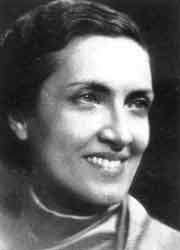|
Биография Cecilia Meireles
Cecília Benevides de Carvalho Meireles (1901-1964, Rio de Janeiro) was a Brazilian writer and educator, known principally as a poet. She is a canonical name of Brazilian Modernism, one of the great female poets in the Portuguese language, and is widely considered the best poetess from Brazil, though she rightly combatted the word "poetess" because of gender discrimination. She traveled in the Americas in the 1940s, on one trip visiting the U.S.A, Mexico, and on others Argentina and Uruguay, and Chile. In the summer of 1940 she gave lectures at the University of Texas, Austin. She wrote two poems about her time in the capital of Texas, and a long (800 lines) very socially-aware poem "USA 1940", which was published posthumously. As a journalist her columns (crônicas, or chronicles) focused most often on education, but also on her trips abroad in the western hemisphere, Portugal, other parts of Europe, Israel, and India (where she received an honorary doctorate). As a poet, her style was mostly neo-symbolist and her themes included ephemeral time and the contemplative life. Even though she was not concerned with local color, native vernacular, or experiments in (popular) syntax, she is considered one of the most important poets of the second phase of the Brazilian Modernism, known for nationalistic vanguardism. As a teacher she did much to promote educational reforms and advocated the construction of children's libraries. 1935-38 she taught at the short-lived federal-district university in Rio.
Cecília Meireles was born in the city of Rio de Janeiro, in the then state of Guanabara. Her father, Carlos Alberto de Carvalho, died three months before her birth. Mathide Benevides, her mother, who was an elementary school teacher, died when Cecília was three. The three other children of this marriage died before Cecìlia was born. She was brought up by a Portuguese grandmother in Rio, who came from the Azores and told her stories from her birthplace. These stories later found their way to Cecilia's poetry. From her nanny, Pedrina, Cecília learned Brazilian folk songs and games. Meireles started to compose poems at the age of nine. She attended normal school in Rio from 1913 to 1916, and after graduating, she was trained as a teacher. However, she continued to study languages, literature, educational theory, music, and folklore. In 1922 she married the Portuguese painter Fernando Correia Dias; they had three daughters: Maria Matilde, Maria Elvira, and Maria Fernanda. The latter is the Brazilian actress who starred in plays and soap operas from the 1970s until the early 1980; she toured US universities to present readings and musical settings of her mother's poems by her son. Mr. Dias, Cecilia's husband, who suffered from acute depression, committed suicide in 1935. Meireles later married agronomist Heitor Grillo, with whom she visited the Pan American Union in DC in 1940. On her initiative the first children's library in Brazil was founded in 1934; she also wrote several children's books. That same year she lectured on Brazilian literature and popular culture in Portugal. Her book Samba Batuque & Macumba was later translated into English (1983).
As a poet Meireles made her debut at the age of eighteen, with Espectros (1919). It has been described as "an airy and vague poetry, languid and fluid, set in an atmosphere of shadows and dreams." The collection of seventeen sonnets dealt with various historical personages. Although her next collections included lyrics in free verse, she still preferred traditional forms and symbolism. Between 1919 and 1927 she contributed to the magazines Arvore Nova and Terra do Sol. She was a key figure in the spiritual and transcendental magazine Festa. The Festa poets supported more traditional expression and universality than the futurists and avant-garde writers of Săo Paulo, whose Modern Art Week in 1922 caused much controversy. Meireles always retained symbolist traits. Especially Portuguese poetry interested her. She visited Portugal in 1934 and lectured there on Brazilian literature at the universities of Lisbon and Coimbra.
Meireles was a prolific contributor to Brazilian periodicals, and for a time she served as education editor of Rio's Diario de Noticías. She translated into Brazilian Portuguese such diverse writers as Maeterlinck, Lorca, Anouilh, Ibsen, Tagore, Rilke, Virginia Woolf, and Pushkin. Her other works include plays and children's books. Cecília Meireles died of cancer in Rio de Janeiro on November 9, 1964. During her career Meireles was affected by many of the literary movements of her time. However, her poetry always remained intensely personal.
In October 2009 she will be one of the three featured authors at the Primeiro Congresso de Escritoras Brasileiras em Nova Iorque / First Congress of Brazilian Women Writers in New York at the Centro Cultural Brasil / Brazilian Endowment for the Arts in midtown Manhattan.
|





